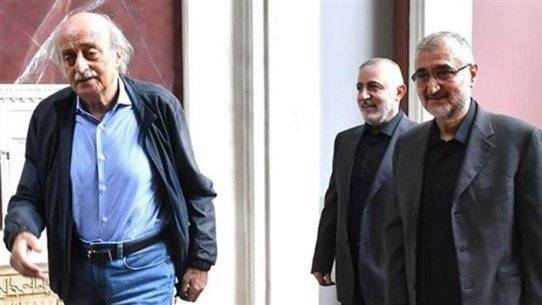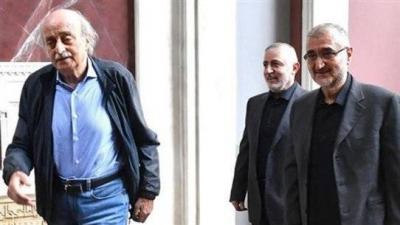Lebanese citizens have been preoccupied with the meeting between Walid Jumblatt and a Hezbollah delegation. Significant analyses and questions are swirling in Lebanese circles about the purpose of this step, especially since it followed a visit by his son, Taymour, to Maronite Patriarch Bechara Rai. This movement comes two weeks before Lebanon enters the constitutional period for electing a new president, which is the main agenda on the table between the two parties.
The meeting has spurred many speculations; some criticized Jumblatt, accusing him of staging a coup, while others seemed to understand his move as potentially foundational for the upcoming phase, particularly through the pursuit of a settlement that would avoid a void and prevent a repetition of Michel Aoun's two-year obstruction period leading to the presidency.
The content of his discussions with the party indicates that Jumblatt has not changed his positions but began his negotiations from a standpoint of strength, being the only Druze representative in the electoral landscape and thus holding significant influence in the presidential election, as the votes of his parliamentary bloc will secure victory for any candidate.
Practically, and according to well-informed sources, Jumblatt aimed to open a new political path through which he prepares for a settlement. He does not separate external developments from internal realities and closely observes regional and local changes, trying to prevent Lebanon from entering any escalation path, which was evident in his discussions with Hezbollah.
In clearer terms, Jumblatt monitors the situation in the region, identifying two possible outcomes: the first being a failure in nuclear negotiations, leading to significant escalation and an effort to avoid confrontation in Lebanon; the other is moving towards agreements regarding both nuclear matters and border demarcation, thereby making the phase governed by reaching a consensus or settlement. Consequently, he decided to take the initiative because he believes Lebanon will be bound by this settlement.
Sources familiar with the meeting's content between Jumblatt and the party summarize it into three main titles: military, political, and economic strategies. On the strategic and military file, Jumblatt inquired about the drone launches towards the Karish field and hoped that it wouldn't be an Iranian message linked to the Vienna negotiations concerning the nuclear agreement. The party delegation responded that it was solely for Lebanese interests and unrelated to the nuclear agreement. Jumblatt advised against going to war, asserting that the situation in Lebanon cannot bear it, adding that Lebanon should not pay the price for regional developments, while announcing that the Americans are working towards a solution. However, the party delegation was unconvinced, claiming the Americans had promised a year ago that Egyptian gas would reach Lebanon, and it still hasn't.
The party delegation confirmed that if the Israelis do not respond and insist on extracting gas before Lebanon begins exploration, and amidst continuous blockade, the party would prefer death in war rather than allowing Lebanese humiliation at the bakery doors.
On the political front, Jumblatt proposed searching for a political settlement involving the election of a consensual president, instead of insisting on a provocative individual aligned with any party. He adopted the Maronite Patriarch Bechara Rai's viewpoint, asserting that it is essential to agree on a president and fulfill the constitutional obligation on schedule since Lebanon cannot withstand a void. The party replied that they were prepared for consensus.
Regarding the economic topic, Jumblatt directly asked the party's delegation about their stance on the agreement with the International Monetary Fund and the necessity of forming a sovereign fund to protect oil wealth. He emphasized the urgency of establishing an electricity plan, arguing that the oil and electricity files should not remain in the hands of Gibran Bassil and expressed that the cost of supporting Bassil from the party was heavy on everyone and on Lebanon.
According to sources close to Jumblatt, he hasn't altered his position but has openly stated it to Hezbollah based on the necessity of reaching a consensual formula while sidelining contentious issues. He insisted on this by sending his son Taymour to Maronite Patriarch Bechara Rai, reaffirming the need to uphold principles and seek common ground that would facilitate the conditions for electing a president. Jumblatt's move is set against the backdrop of ongoing negotiations among various regional forces. It is a path opened in Lebanon, which is expected to resonate regionally and internationally, while Jumblatt assured the party's delegation of his eagerness to hear answers from the party and its Secretary-General Hassan Nasrallah personally regarding all these inquiries and ideas.




